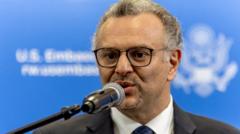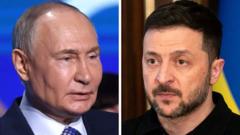In a contentious exchange, former U.S. President Trump has rebuked Ukrainian President Zelensky for rejecting a newly proposed peace plan that favors Russian territorial claims, drawing significant attention to U.S. foreign policy decisions regarding the ongoing conflict.
Tensions Rise as Trump Pressures Ukraine to Accept Controversial Peace Proposal

Tensions Rise as Trump Pressures Ukraine to Accept Controversial Peace Proposal
Former President Trump criticizes Ukraine's rejection of a peace plan aligning with Russian interests, escalating diplomatic tensions.
In a notable development concerning U.S.-Ukraine relations, former President Donald Trump publicly criticized Ukrainian President Volodymyr Zelensky after Zelensky rejected a proposed peace plan aimed at resolving the war with Russia. Trump's remarks reflect a growing rift between U.S. expectations and Ukraine's stance on its sovereignty and territorial integrity.
The U.S. proposal, as detailed by Vice President JD Vance, advocates for a "freeze" of territorial lines established during the three-year conflict, acceptance of Russia's occupation of Crimea since 2014, and a guarantee that Ukraine will not pursue NATO membership. This peace proposal, which aligns closely with Russian objectives, marks a significant shift in U.S. diplomatic strategy toward the region.
Trump's critique on social media made headlines, with the former president asserting that Zelensky must choose between peace and continued conflict, claiming that Ukraine's resistance to the terms would result in further suffering. “He can have Peace or, he can fight for another three years before losing the whole Country,” Trump stated, suggesting that Zelensky's rejection could prolong hostilities and exacerbate the humanitarian crisis in the region.
In response, Zelensky firmly rejected the legitimacy of the Russian annexation of Crimea, emphasizing that relinquishing any part of Ukraine's territory contradicts national law. “There is nothing to talk about,” he said, asserting that Crimea is Ukrainian land.
Trump's comments also addressed Zelensky's position, accusing him of making “inflammatory” statements and questioning why Ukraine did not defend Crimea when it was annexed in 2014. “The statement made by Zelensky today will do nothing but prolong the ‘killing field’,” Trump wrote, highlighting the sensitivities surrounding the ongoing conflict and the complex nature of geopolitical negotiations.
As the U.S. navigates this delicate situation, the potential acceptance or rejection of the proposed peace plan remains at the forefront, with implications not only for Ukraine but also for broader U.S.-Russia relations. The ongoing military occupation of about 20 percent of Ukrainian territory by Russia continues to create a challenging dynamic for Zelensky and his government as they seek international support to reclaim lost land.





















